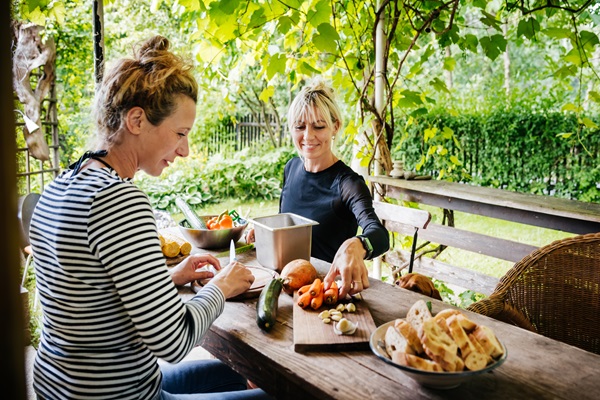-
If chicken breasts and powdered shakes are the only things that come to mind when you think of protein, think again. There’s a wide range of protein-rich foods and they can offer a lot more than just protein.
Advanced Accredited Practising Dietitian and co-founder of Oncore Nutrition Lauren Atkins encourages people to think about the whole package when it comes to choosing proteins.
“I like to think about our protein sources and what else they can offer us,” says Lauren. “While a chicken breast or steak might be slightly higher in protein, we may be missing out on other important nutrients we could get from an alternative source of protein.”
She shared her top proteins to include as part of a balanced diet.
5 proteins for a balanced diet
Oily fish
Oily fish can offer you lots of protein, but it also packed with omega-3s which are beneficial for our joints, hearts and brain. Oily fish includes salmon, mackerel, trout and sardines.
RECIPE IDEA: Pistachio-crusted salmon super salad
Legumes
Often overlooked, the humble legume is packed with both protein and fibre, says Lauren.
“They will give us protein, but they will also give us fibre and prebiotics, which our gut bacteria love and thrive off.”
Legumes include lentils, chickpeas, kidney beans and pulses. Try adding some hummus to your lunchtime sandwich, or add some lentils to your next bolognese.
RECIPE IDEA: Zesty mixed bean and olive salad
Dairy
Milk, quality yoghurt, and cheese provide protein, but they can also support bone and gut health.
“Dairy gives us protein but it will also give us calcium, which we know is important for our bone health,” says Lauren. “While fermented dairy products, like a high-quality Greek yoghurt or kefir, can offer benefits for our gut microbiome.”
Adding a dollop of Greek yoghurt to your breakfast or on top of a curry is a great way to get some more protein into your meals.
Nuts and seeds
A sprinkling of nuts or seeds added to your meal makes for some tasty crunch as well as offering extra protein, fibre, vitamins and minerals.
Try peanuts, walnuts, macadamias, flaxseeds, pine nuts or almonds.
Eggs
The humble egg offers so much more than protein. They’re packed with vitamin D, which helps to maintain strong bones and muscles.
RECIPE IDEA: Cat’s brilliant baked eggs
5 healthy proteins for a balanced diet


Put rewards on the menu
Munch, crunch or lunch your way to a reward with delicious healthy meals.
Healthy meal choices could get you closer to rewards from THE ICONIC, Apple, adidas and more with Live Better Rewards.
Eligible Medibank members with hospital and/or extras cover could earn up to $400 worth of rewards every year from our partners - THE ICONIC, adidas and more. *^
-
The difference between animal and plant proteins
As the name suggests, animal proteins come from animals, and include meat, dairy and eggs. Most animal proteins are known as complete sources of protein, which means they have all 9 essential amino acids that our bodies need in sufficient amounts.
Proteins can also come from plants, but are not always complete. However, Lauren stresses that it is still very achievable to get enough complete protein through a plant-based diet.
“It’s important for vegetarians and the general population to understand that you don't have to eat a lot of meat and animal-based products to achieve sufficient protein.”
Complete plant-based proteins
There are some complete plant-based proteins, including:
- Soy, including soy-products like tofu an edamame beans
- Quinoa
- Buckwheat, which is used to make soba noodles.
It’s also very easy to combine plant proteins to get a complete protein source, says Lauren.
“Combinations like peanut butter with whole grain toast and a lentil curry with brown rice will give you a complete protein source.”
Do you need a protein supplement?
With all these wonderful sources of protein, you may wonder what the protein powder hype is about. But they do have a place, says Lauren.
“Protein powders and supplements can be helpful for those who have an increased protein need, particularly if they're struggling to achieve that need through food alone. For example, people who are competitive athletes, busy mums who go to the gym and struggle to eat breakfast, or someone with a medical condition who requires more protein.”
She stresses that if you do choose to use a supplement, it’s important to choose a high-quality one.
“There are some very pure whole-food-based supplements available, for example, powders that are 100% hemp seed based,” she says. “They will be very neutral and safe.”
“But beware of highly-processed powders or products that contain sweeteners, thickeners and artificial flavours. These products are likely to cause you more issues down the track than the benefits you might get from the extra protein.”
READ MORE: How much protein do you really need?

Stretch your extras further.
With over 550 Members’ Choice Advantage physio provider practices Australia wide, our Members’ Choice Advantage physiotherapy network generally offers members greater value from their Extras cover, with capped fees to help reduce out-of-pocket expenses*~
-
Training? Expert tips to help you get your nutrition right
Top nutrition tips for women training for a run, race or sporting event, according to an expert.
-
Fuel your body at any age
Nutrition tips for women who want to stay active at all stages of life, straight from a sports dietitian.
-
How to keep your iron levels up as an active woman
Iron deficiency – and sometimes anaemia – can be a common problem for active women. Here’s how to help ensure you’re getting enough iron.
-
Eating for your brain health
Accredited Practising Dietitian Laura Thomas discusses the best diet for supporting brain health and her top tips for adopting brain-healthy eating habits.
-
How much protein do you really need?
A dietitian explains how much protein you need to build muscle, lose weight and maintain strength as you age. And how to include it as part of a balanced diet.
-
Vegetarian shepherd’s pie recipe
Cozy up with this hearty vegetarian shepherd’s pie packed with veggies.
Things you should know
Must be 16 years or over to register for Medibank Live Better rewards. Some program partners and earning activities require a person to be at least 18 years of age to be eligible to earn and/or redeem a reward. Must be a Medibank member with hospital cover, extras cover, or hospital and extras cover, be up-to-date with premium payments and have signed up to Medibank Live Better rewards in the My Medibank app to earn Live Better points for eligible purchases and redeem rewards. Excludes Overseas Student Health Cover (OSHC), Ambulance only cover, ahm covers and other selected covers. Live Better Management Pty Ltd, ACN 003 457 289 has entered into commercial arrangements with Medibank Live Better program partners and may receive commissions. Additional terms and conditions may apply to points earning activities and rewards. Points earning activities and rewards are subject to change and may be subject to availability. Wherever possible, we will give you notice of these changes. See full Medibank Live Better rewards terms.
Medibank Live Better Challenges & Goals Earning Policy: The participant of a Medibank Live Better Challenge or Goal may not receive Live Better points or may have their already credited Live Better points reversed in accordance with the Medibank Live Better terms and conditions. To earn Live Better points, the participant needs to properly complete 100% of the eligible Challenge according to the instructions. The number of Live Better points available for Medibank Live Better Challenges and Goals is subject to change without prior notice. The maximum number of Live Better points that each Medibank Live Better member can earn from successfully completing health and wellbeing Challenges, Goals or any Onboarding action in a calendar year is 40,000 Live Better points. To the extent of any inconsistency between this Policy and the Medibank Live Better terms and conditions, the terms and conditions will take precedence.
*Waiting periods apply.
~Members' Choice providers are not available in all areas and may change without notice.





